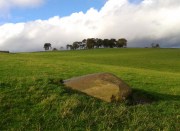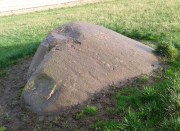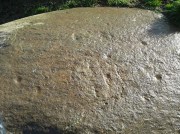Cup-and-Ring Stone: OS Grid Reference – NO 19639 51153
Also Known as:
- Canmore ID 29141
- Mains of Creuchie
Take the A93 road north out of Blairgowrie for 5 miles or so to the Bridge of Cally, making sure you do NOT drive up the A924. Keep on the A93 for a coupla hundred yards, just as you come out of the village take the right turn on the minor road to Drimmie. When you hit the dead straight section of road, turn left near its end. The follow this bendy moorland road for 1½ miles (2½km) where a small copse of trees appears on the nearby hillock on your left. In the next field past this, close to the roadside, you’ll see a large boulder.
Archaeology & History
A large rock in the large field 350 yards (320m) SSE of the lovely Park Neuk stone circle which was described by the Royal Commission (1990) lads as being a “cup-and-ring” stone is, sadly, not as impressive as it sounds. The carving was initially rediscovered and described by Mrs Lye (1982) who told:
“A large glacial erratic boulder with ten cup marks scattered over its surface lies in a field one sixth of a mile SSE of the ‘four poster’ and ruined stone circle at Heatheryhaugh. The boulder is garnet mica schist and is 3m long, NS, by 2.70 wide, EW, with a circumference of 9m at ground level.”
When the Royal Commission visited the carving in 1987 they found that it had,
“on its sloping W face at least fifteen weathered cupmarks, two cups with single rings and one cup with a possible ring; the cupmarks average 50mm in diameter by 15mm in depth.”
But some of these ‘cups’ are, without doubt, geological in origin – and when Paul Hornby and I visited the stone in near perfect weather conditions, there was only one ring very faintly discernible, with a possible arc on the top-edge of another ‘cup’. You can see from a couple of the photos how some of the cupmarks are geophysical in nature. The cups with greater veracity were very probably etched from the natural cut in the stone (as found at Stag Cottage and many other cup-and-rings).
References:
- Lye, Mrs D., “Heatheryhaugh: Cupmarked Stone,” in Discovery & Excavation in Scotland, 1982.
- Royal Commission on the Ancient & Historical Monuments of Scotland, North-East Perth: An Archaeological Landscape, HMSO: Edinburgh 1990.
© Paul Bennett, The Northern Antiquarian


